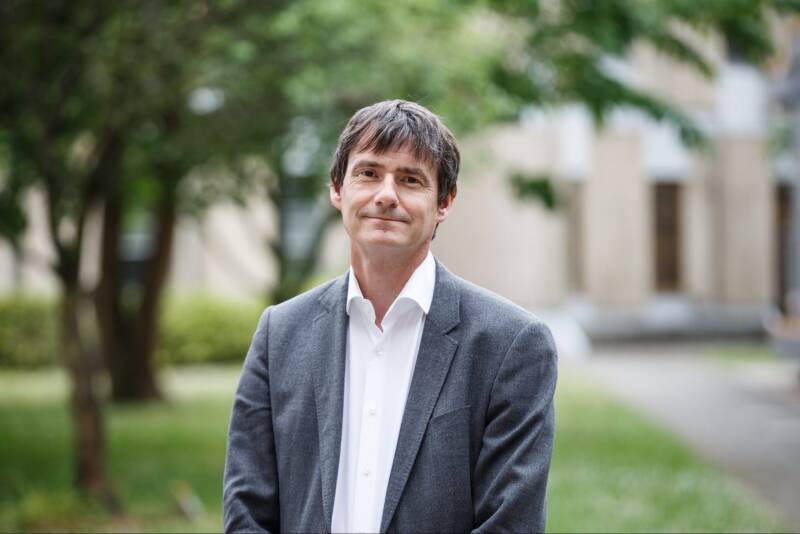Professor Gordon Lynch has spent a career combining academia with activism to address historical policy failures around child migrants. Written by Sunder Mahendra.
Between 1869 and 1970, around 100,000 unaccompanied children were sent from the UK to other parts of the British Empire and Commonwealth through child migration programmes funded by governments and delivered by leading charities, churches, and religious orders. Recent research by Gordon Lynch, Professor of Modern Theology at the University of Kent, has focused on the origins, motivations and operations of these programmes as well as the changing policy environments in which they operated.
Embracing the idea of pursuing scholarly work in tandem with activism and carrying a sense of responsibility to interact and communicate not only with fellow scholars, but with a broader community, Professor Lynch, engaged in public outreach activities such as co-curation of a widely commended national exhibition, a related music project that received national performances and broadcasts, and his work as an expert witness for two national child abuse Inquiries. His research and public outreach activities has contributed directly to the creation of a UK Government redress scheme for former child migrants, and has been a primary influence on public understanding of this history over the past six years, reaching an estimated audience of around 20-25 million people
Professor Lynch was an academic curator to the exhibition, On Their Own: Britain’s Child Migrants, displayed at the V&A Museum of Childhood between October 2015 and June 2016 which explored the often heart-breaking stories of British children who were sent to Canada, Australia and other Commonwealth countries between 1869 and 1970. It shows that lives of were shaped irrevocably by a lack of proper care and, in some cases, horrendous abuse.
Professor Lynch worked closely with staff at the museum to agree the design and content of the exhibition, and contributed most of the text that visitors read. As British child migrants often had few material objects, much thought had to be put into how to develop a range of displays that would bring this history to life. Professor Lynch played a leading role in designing a wide range of audio and visual resources for use in the exhibition. Former child migrants who visited the exhibition from Australia commented on how these had captured their complex and often painful experiences overseas.
Professor Lynch’s underpinning research for the Museum of Childhood’s exhibition was published as Remembering Child Migration: Faith, Nation-Building and the Wounds of Charity by Bloomsbury in 2015. The book examines the histories, methods and rationales of children migration programs in the United Kingdom and the United States, where more than 300,000 children were re-located away from birth parents and home communities between 1851 and 1970. These schemes, influenced and strengthened by the moral sentiments of their time, were perceived as a means to grant children “better future and making them better people,” in order to save them from poverty, parental ill-condition, or family breakdown. At its heart, the book considers how welfare interventions motivated by humanitarian piety came to have harmful effects in the lives of many child migrants. By examining how strong moral motivations can deflect critical reflection, legitimise power and build unwarranted bonds of trust, it explores the promise and risks of humanitarian sentiment.
Since the exhibition Professor Lynch and his work has had widespread national and regional media coverage. This includes interviews or mentions in newspapers including the Independent and Guardian, an interview on BBC Radio 2’s Jeremy Vine programme, and a feature on BBC South East’s evening news programme. In collaboration with the leading folk music producer John Leonard, Professor Lynch also commissioned and worked with the production company, 7digital, for several of Britain’s top folk songwriters to write songs for the exhibition reflecting British child migrants’ experiences that were used as audio displays for the exhibition. He provided copies of relevant primary materials and draft chapters, which the musicians used as the basis for these new compositions. This project was released as an album, The Ballads of Child Migration. Ballads of Child Migration is a multi-media show which tells the story of Britain’s Child Migrants.
In collaboration with the leading folk music producer John Leonard, Professor Lynch also commissioned and worked with the production company, 7digital, for several of Britain’s top folk songwriters to write songs for the exhibition reflecting British child migrants’ experiences that were used as audio displays for the exhibition. He provided copies of relevant primary materials and draft chapters, which the musicians used as the basis for these new compositions. This project was released as an album, The Ballads of Child Migration. Ballads of Child Migration is a multi-media show which tells the story of Britain’s Child Migrants. The show consists of narration, music, photographs and film clips of interviews with surviving child migrants, as well as excerpts from an Australian documentary, “The Long Journey Home”.
A short set of songs from the Ballads of Child Migration was performed at the BBC Radio 2 annual Folk Awards ceremony at the Royal Albert Hall on 5 April 2017, with simultaneous live radio broadcast. Following a national tour of the Ballads project in the autumn of 2018, a programme of the BBC Radio 2 Folk Show was broadcast on 16 January 2019 dedicated to live performances from this tour. Songs from the Ballads were also used to provide the structure for a four-part musical dramatisation of Michael Morpurgo’s children’s novel All Alone on a Wide, Wide Sea, broadcast during the station’s flagship Jeremy Vine Show in August 2018 and starring Jason Donovan and Toby Jones. Lynch was interviewed again on the BBC Radio 2 Jeremy Vine Show on the same day as the broadcast of the first episode.
On the basis of his research and public engagement, Professor Lynch was placed under instruction to the Independent Inquiry into Child Sexual Abuse (IICSA) in September 2016 as an expert witness for its child migration programmes investigation. He worked collaboratively with another expert witness, Stephen Constantine, for twelve months analysing relevant archival material (including material not previously seen by researchers). He and Constantine co-authored 250,000 words of reports and addenda requested by the Inquiry, and Lynch gave oral evidence during 9 of the 20 days of public hearings of this investigation in 2017. Professor Lynch was subsequently engaged in 2018 as an expert witness by the Scottish Child Abuse Inquiry (SCAI) for its investigation of the migration of Scottish children, and both helped to co-author a major report on these schemes requested by the Inquiry team, and gave evidence over three days of its public hearings in September and October 2020

